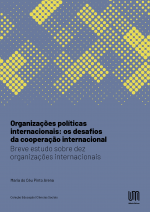Organizações políticas internacionais: os desafios da cooperação internacional: Breve estudo sobre dez organizações internacionais
Palavras-chave:
Organizações Internacionais, ONU, Conselho da Europa, NATO, Organização sobre a Segurança e Cooperação na Europa, Comunidade dos Países de Língua Portuguesa, União Africana, Organização dos Estados Americanos, Associação de Nações do Sudeste Asiático (ASEAN), Liga Árabe, Organização de Cooperação de XangaiSinopse
As organizações internacionais (OI) são atores centrais do sistema internacional, pois são fóruns onde as ideias se desenvolvem e adquirem legitimidade e se transformam em decisões que têm impacto na sociedade internacional. As organizações internacionais são um fórum de diálogo entre os seus membros e permitem o encontro de soluções para problemas que lhes são comuns e que afetam a comunidade. De resto, a expansão das suas tarefas reflete a sua capacidade de influência. Contudo, as OI ressentem-se de algumas deficiências: a sua autoridade pode ser ténue e descentralizada; a ausência de uma cultura comum robusta e a impossibilidade de impor decisões ou medidas coercivas.
Este livro centra-se nas mais importantes e representativas organizações políticas internacionais. Apresenta um breve estudo sobre as Nações Unidas, o Conselho da Europa (CoE), a NATO, a Organização sobre a Segurança e Cooperação na Europa (OSCE), a Comunidade dos Países de Língua Portuguesa (CPLP), a União Africana (UA), a Organização dos Estados Americanos (OEA), a Liga Árabe, a Associação de Nações do Sudeste Asiático (ASEAN) e a Organização de Cooperação de Xangai. As organizações são analisadas tendo em conta a sua génese histórica, o contexto da sua criação, a sua estrutura orgânica e as suas principais áreas de atuação.
Downloads

Publicado
Séries
Categorias
Licença

Este trabalho encontra-se publicado com a Licença Internacional Creative Commons Atribuição 4.0.






